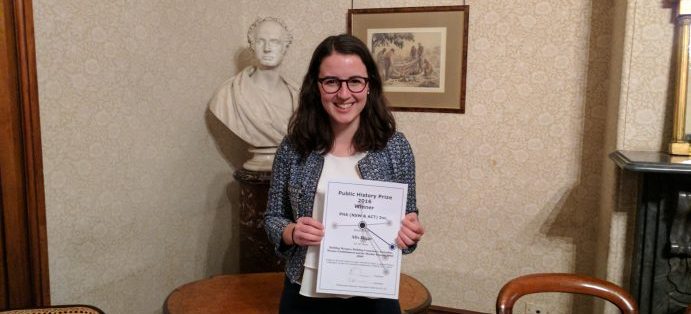The Public History Prize seeks to encourage historical practice that is applied to real world issues. It invites entries from undergraduate, graduate diploma and master students in NSW and the ACT , which demonstrate excellence in writing or other media, and the ability to interpret the past in a contextual way. The Prize for 2016 was awarded to Alix Biggs. The judges commended her elegant writing style and her use of historical analysis of mosque building to illustrate the creation of an Australian Muslim identity. Highly commended was an essay by Daniel McKay, which examines Stanley Bruce’s belief that constitutional history was not just interesting but essential to contemporary understandings about constitutional practice.
Here Alix reflects on the role of history in her professional and personal life.
What are your plans after university? Are you pursuing a career in the history sector?
After completing my Honours in History at the Australian National University, I’m now working in corporate finance – a big transition but certainly keeping my analytical skills sharp! I don’t see a future career for myself in the historical profession but certainly I think that history will always inform my work and interests. I am hoping to pursue postgraduate studies in migration and public policy, two areas where a keen sense of the past can absolutely help inform critical decision making.
Why did you choose to write about your topic?
E.P. Thompson wrote that ‘we look into the past and inevitably write something about ourselves’. I spent several years living in Muslim-majority countries: three in conservative Saudi Arabia and three in more secular Turkey. Mosques were a common feature of the streetscapes of my childhood, with the call to prayer regularly punctuating my day. While I sought to detach my research from my own political concerns and experience of Islam and the Middle East, it was undoubtedly influenced by a particular and distinct sense of time and place. As Australia grapples with notions of multiculturalism and religious accommodation, my writing acts as my small contribution to current discourse that at times is poisonous and ill-informed.
Why is history important today?
History will never stop being important. Every day our politicians draw on historical imagery, and so often we see parallels between what is being reported in the news and events from the past. I think that in-depth knowledge of history can only be a good thing: its capacity to help us understand complex situations and inform policy-making makes it an integral part of civic virtue and political engagement.
What’s your favourite historical source, book, website or film?
I think, in part, my love of history is a product of watching endless BBC historical documentaries as a child (Simon Schama was a standout, as was the series People’s Century), so I have enormous respect for the ability of quality documentaries to make history accessible and engaging to broad audiences. I’m also increasingly fond of personal letters as means to understanding characters from the past. Recent highlights have included the collected letters of Gertrude Bell and Freya Stark, two remarkable women travelling and working in the Middle East in the first half of the twentieth century.
If you had a time machine, where would you go, and why?
Until a time machine becomes accessible, I’ve found that travel has proven the most compelling way of experiencing the past. It’s impossible to stand in Istanbul’s Hagia Sophia and not feel awed by this building that has witnessed fifteen centuries of seismic, world-changing history. My travels (and indeed, any hypothetical time machine!) keep returning me to the Middle East, where so often the past feels incredibly present and pressing. I would, however, love to return to some of my favourite destinations during their ‘golden ages’ – perhaps Safavid Isfahan, Mamluk Cairo and Ottoman Istanbul.
Image: http://mosque-finder.com.au/assets/Uploads/auburn-gallipoli-mosque.jpg
